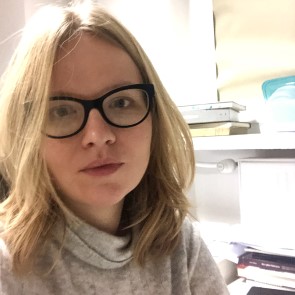
“The Life of Mordechai Anielewicz Reconsidered”
Professional Background
Maria Ferenc (she/her) is a social historian of Polish Jews during the Holocaust. She works as Assistant Professor at the Jewish Historical Institute in Warsaw, where she coordinates the research project, Encyclopedia of the Warsaw Ghetto. In 2021 she received her PhD from the University of Warsaw.
Dr. Ferenc has published several pieces, including a recently published book based on her dissertation entitled, “Każdy pyta, co z nami będzie”. Mieszkańcy getta warszawskiego wobec wiadomości o wojnie i Zagładzie [‘Everyone asks what will become of us’. Inhabitants of the Warsaw ghetto in the face of the news about war and the Holocaust] (2021). Maria's most recent article is, “‘Each Day the Ghetto Has to Find Consolation in Something’. False News as Breaking News in the Warsaw Ghetto” (co-authored with Piotr Laskowski), which appeared in Radical History Review. She has also published in e.g., in Zagłada Żydów, Gal Ed, Media History, and Annales de démographie Historique. She has also edited 3 volumes of documents from the Ringelblum Archive of the Warsaw Ghetto.
In addition, Maria has been awarded several fellowships including from the European Holocaust Research Infrastructure, Yad Vashem, Fondation Memoire de la Shoah, Polish Ministry of Higher Education, and National Science Centre.
Fellowship Research
During her fellowship at Mandel Center for Advanced Holocaust Studies, Maria will be working on the biography of Mordechai Anielewicz, the commander of the Jewish Fighting Organization and one of the leaders of the Warsaw ghetto uprising. Maria will seek to answer how one out of many leaders of the Polish branch of Hashomer Hatzair has become ‘the Anielewicz’ we know today. Was his leadership purely accidental? What does his biography tell us on the complexity of Jewish responses to the World War II and changing strategies of resistance against the Nazis?
Much of what scholars know about Anielewicz has been developed through interpretation. Anielewicz’s story it is governed by a narrative of Jewish resistance and heroic, yet hopeless, defiance. It is conceived of almost as if the main path of his life was to become the commander of the Warsaw Ghetto Uprising. Some say that history is written by the victors – in this case, it was written by survivors of one of the most tragic events in human history, who wanted to commemorate their friend but also show the resiliency of Jews during the Holocaust.
Drawing upon Museum resources, Maria will collect documents pertaining to Anielewicz's biography. She will also examine post-war testimonies and materials to see how Anielewicz was remembered and commemorated – on individual and collective levels. How did various stories about him resonate with various postwar political realities of Israel, Poland and Western countries? Is it possible to peel off the layers of interpretation and to reconstruct the story of Anielewicz’s life anew?
